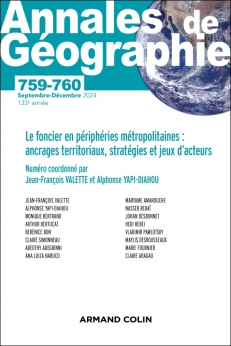
ANNALES DE GÉOGRAPHIE N°759-760 (5-6/2024)
Pour acheter ce numéro, contactez-nous
Recevez les numéros de l'année en cours et accédez à l'intégralité des articles en ligne.
Le rétrozonage est une pratique opérée par les communes ou intercommunalités compétentes en matière d’urbanisme et qui consiste à réaffecter des zones antérieurement à urbaniser à des usages agricoles ou naturels dans le cadre de leur plan local d’urbanisme (PLU/PLUi). Etant perçu essentiellement comme induisant une perte de valeur vénale de la terre, le rétrozonage génère des conflits chez les propriétaires fonciers s’estimant lésés et peut se transformer en contentieux administratif. Il peut tout autant emporter l’adhésion de la population lorsqu’il s’inscrit dans un projet territorial. Face à l’accélération du recours au rétrozonage, portée par un contexte juridique et politique de sobriété foncière, cet article propose une analyse juridique et territoriale des conflits en découlant afin de proposer des pistes pour favoriser la compréhension de cette démarche.
Retrozoning is a practice carried out by municipalities or inter-municipalities with urban planning powers, which consists of reallocating previously urbanized zones to agricultural or natural uses within the framework of their local urban plan (PLU/PLUi). Retrozoning is mainly perceived as leading to a loss of land value, and can generate conflicts among landowners who feel they have been wronged, which can lead to administrative disputes. In the meantime, it can win public support when it is part of a territorial project. Faced with the accelerating use of retrozoning, driven by a legal and political context of land sobriety, this article proposes a legal and territorial analysis of the conflicts arising from it, in order to suggest ways of promoting understanding of this approach.